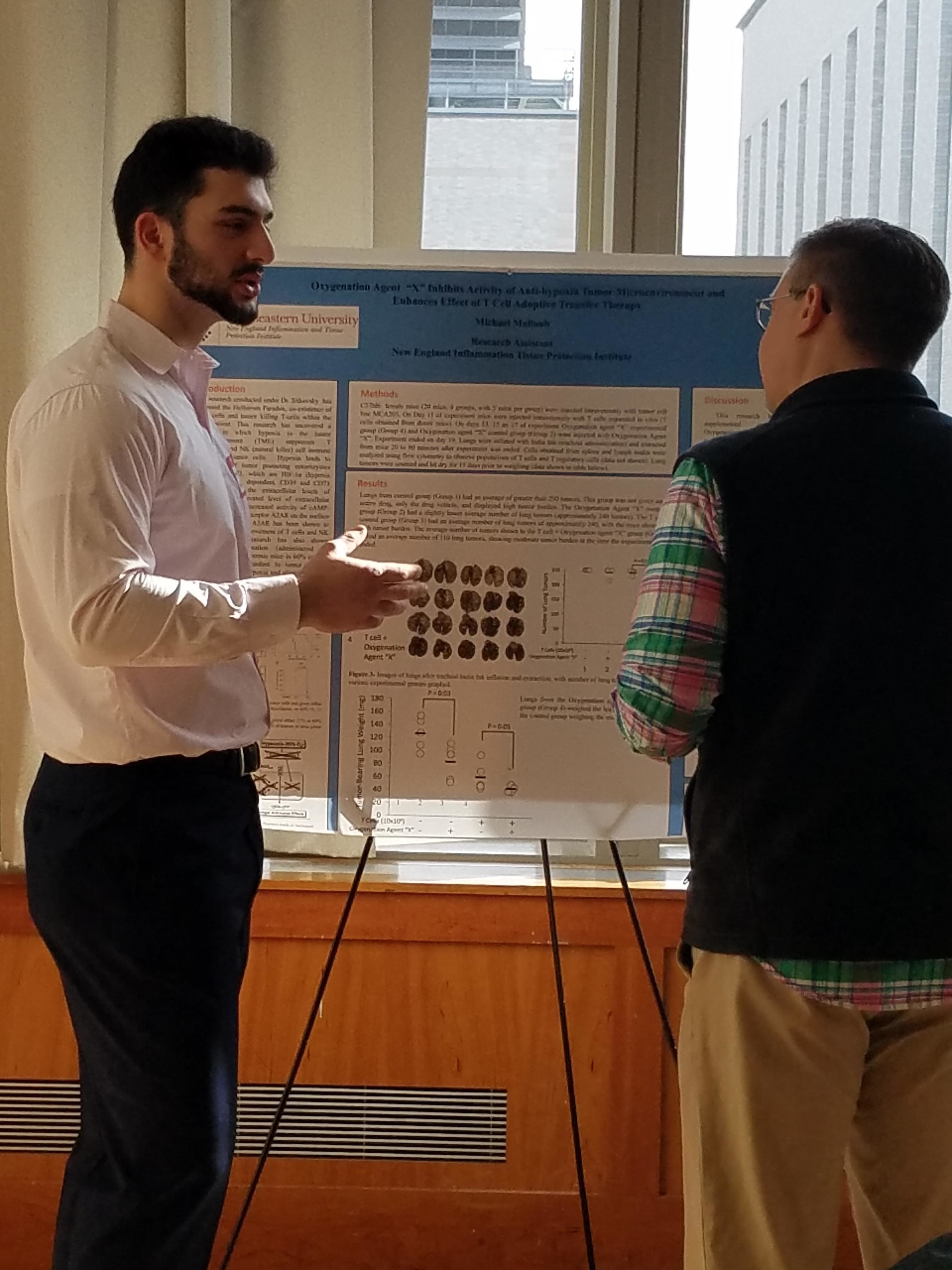Meet Michael Mallouh, fourth year biology major, psychology minor, and on the pre-med track. Mallouh is driven by his goal to becoming an oncologist, to help deliver new immunological treatments to patients. Mallouh has maximized his time at Northeastern and in the College of Science to take advantage of co-ops, student leadership, and connections with professors and mentors. Through this, he has found his passion for the future and gained the invaluable experiences that will help to get him there.
What is your favorite part about being a student at Northeastern?
My favorite part about being a student at Northeastern is the esteemed student body I am a part of. It feels like almost every student I meet is involved in research that has immense potential to make an impact, or is on track to create change in their field or community.
One of my favorite experiences to date has been presenting at the Matz Symposium, in front of esteemed professors and deans from Northeastern. Getting the chance to share research with those outside of one’s lab, is something that is not to be taken for granted, and I enjoyed in thoroughly.
What else are you involved in at Northeastern?
I am on the E-board as the Treasurer for Students for Education Reform club (SFER). We focus on current inequalities minority students face in the classroom and how we can organize and advocate within our community to try and exact change to counteract those inequalities.
Each year, alumnus Dr. Andrew Schafer funds one student in their six month co-op experience to work with a faculty member at Northeastern. As this year’s recipient of the Schafer co-op scholarship, Mallouh is working with Dr. Michail Sitkovsky doing research in the New England Inflammation and Tissue Protection Institute (NEITPI).
What does the Schafer Co-op Scholarship mean to you?
The Schafer Scholarship has given me the amazing opportunity to work full time in the lab and put forth full effort into contributing to the amazing work going on at NEITPI. I had the amazing chance to present to Dr. Schafer on the work I have been doing at NEITPI and his input on the potential applications of the research was eye opening. Further, he gave me great insights on how I could look to continue my research and research in general as I look to matriculate into medical school, and even how I could do so should I be privileged enough to become a physician.
Tell us about this research and how is this important for your future.
My research under Dr. Michail Sitkovsky primarily concerns A2AR antagonists and oxygenation agents. This research expands on his previously groundbreaking discoveries regarding the role of the A2AR receptor as a non-redundant immunosuppressive factor in the tumor micro-environment. The research into oxygenation agents is in an attempt to achieve the success discovered by Dr. Sitkovsky in having mice breathe 60 percent oxygen, enabling lymphocytes to function properly and attack tumor cells, disabling the tumor micro-environment suppression of lymphocytes.
This research has involved learning many cell culture techniques as well as the in vivo work with mice. I want to work on such immunological approaches in the future, with my main focus being in patient care as an oncologist, serving to implement such life changing treatments. I wish to serve as a liaison between the amazing research happening in the field of immunology and the patients that need these treatments the most.
What advice do you have for incoming freshmen in your field?
I would recommend that freshmen get involved in research as soon as they can. Research is a field you cannot take shortcuts in, and you must put in time to learn skills that will make you an asset to the lab you are a part of. Getting involved in research early on, will make the more exciting and higher level co-ops available to students on their first cycle, rather than having to wait until they are upperclassmen. With all of this comes not being afraid to advocate for yourself, and literally knocking on the doors of professors doing research to ask for an opportunity to be a part of their lab. The vast majority of professors are very friendly and will point you in the right direction, even if they do not have space in their own labs.
Mallouh would like to thank Dr. Sitkovsky and Dr. Stephen Hatfield for giving him the opportunities that changed how he hopes to approach his path towards becoming an oncologist and one day working with patients. He would also like to thank co-op advisors Tina Mello and Veronica Porter for their dedication to helping Mallouh find great co-ops, helping him to find opportunities that fit into a busy schedule, timeline to medical school, and simultaneously being work that he really enjoys.
Biology
Psychology

